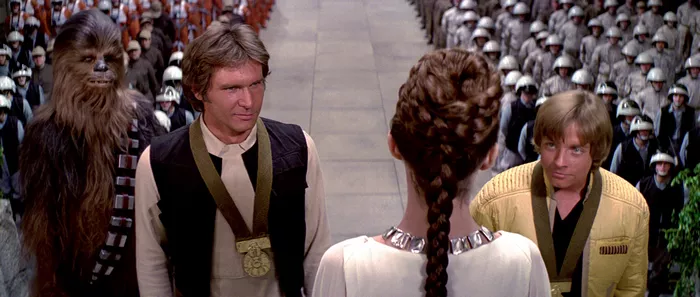Star Wars: Episode IV – A New Hope, the film that birthed a cultural phenomenon, has been dissected and analyzed by fans for decades. While the absence of a medal for Chewbacca during the iconic ceremony has been a point of contention, it turns out that this is just the tip of the iceberg. Beneath the surface, a much more significant problem lurks—one that involves not just a character’s omission but a fundamental narrative inconsistency that challenges the logic of the Rebel Alliance’s actions.
I. Chewbacca’s Snub: A Minor Quibble in Comparison
The outcry over Chewbacca not receiving a medal in A New Hope has echoed through the Star Wars fandom for years. However, as fervent as this discussion has been, it serves as a diversion from a more critical issue: the rebels’ decision to hold a medal ceremony at all. Chewbacca’s snub, while a point of frustration for many fans, is overshadowed by the broader question of why the Rebel Alliance would risk a public celebration when the Imperial Fleet is presumably still a threat.
II. Celebrating in the Shadow of Danger: The Perilous Medal Ceremony
The medal ceremony at the end of A New Hope, where Luke Skywalker, Han Solo, and Chewbacca receive recognition for their heroic actions against the Death Star, is a moment of triumph. However, it also raises a fundamental question about the rebels’ strategic decision-making. Why, after delivering a significant blow to the Empire, would they gather in such a public and stationary manner for a ceremony? The risk of an Imperial counterattack is glaringly evident, and the decision to celebrate in this manner seems counterintuitive for a group that has just emerged from a harrowing battle.
III. Canon Conundrum: Acknowledging and Attempting to Fix the Issue
In an attempt to address the logical flaw in A New Hope’s ending, the official Star Wars canon has grappled with the question of the medal ceremony. Various Expanded Universe materials and official statements have tried to provide context, explaining that the ceremony was a swift and discreet affair, minimizing the risk of an Imperial response. However, these efforts to retcon the narrative only serve to draw more attention to the issue and, in some cases, introduce additional inconsistencies. The canonical dilemma surrounding the ceremony highlights the challenge of rectifying narrative missteps, especially when they involve fundamental aspects of the story.
IV. Evacuation Urgency: Contradictions in Rebel Strategy
The attempt to rationalize the medal ceremony not only draws attention to the initial narrative flaw but also highlights broader inconsistencies in the rebels’ behavior across the Star Wars saga. If the Rebel Alliance was truly concerned about the imminent threat of the Imperial Fleet, as suggested by their discreet ceremony explanation, why does the urgency to evacuate not carry over into subsequent films? The rebels are often portrayed as nimble and strategic, yet their actions in A New Hope’s closing scenes and the subsequent inconsistent portrayals undermine this characterization.
V. The Bigger Problem: A Narrative Oversight with Galactic Ramifications
In conclusion, while the absence of Chewbacca’s medal in A New Hope has been a source of debate, it is merely a symptom of a more significant problem—the questionable decision to hold a public medal ceremony in the face of potential Imperial reprisals. The attempt to address this narrative oversight within the canon has only fueled discussions and highlighted broader inconsistencies in the rebels’ strategic thinking. As Star Wars enthusiasts continue to dissect the galaxy far, far away, the medal ceremony stands as a symbol of the challenges that storytellers face when attempting to reconcile narrative missteps and the delicate balance between satisfying fans’ desire for closure and maintaining the logical integrity of a fictional universe.

